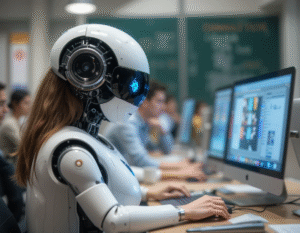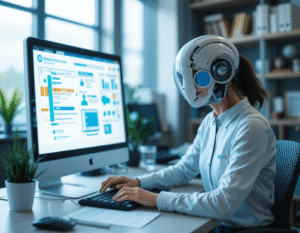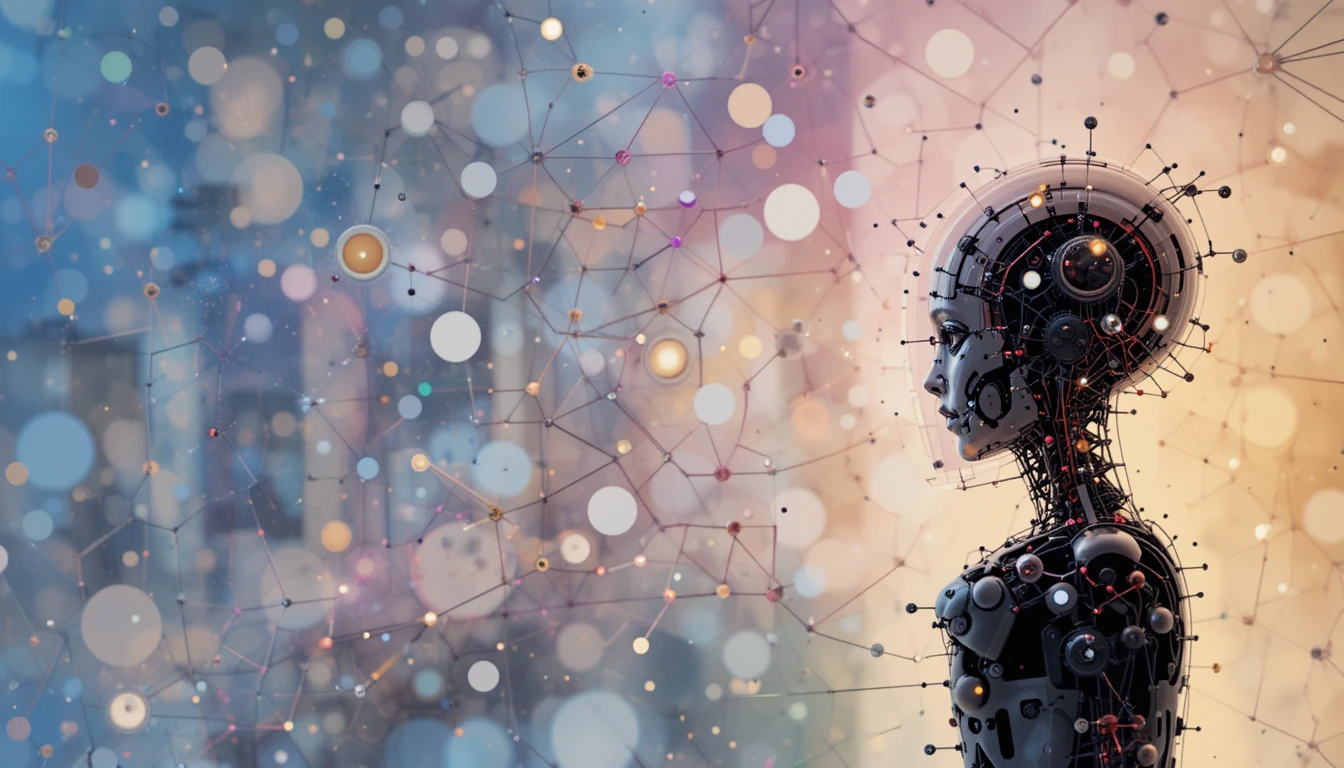Artificial Intelligence (AI) is no longer just a concept discussed in tech labs or science fiction movies. It’s becoming a practical tool that is reshaping the classroom as we know it. From adaptive learning systems to intelligent teaching assistants and fully immersive AI environments, the education sector is on the brink of a major transformation.
So, what exactly will classrooms look like five, ten, or twenty years from now? How will teachers, students, and even schools change as AI continues to evolve?
In this blog, we explore the future of AI in classrooms, what to expect, and how we can prepare for this exciting, tech-driven educational revolution.
1. Personalized Learning for Every Student
In the future, AI will allow educators to customize learning like never before.
Right now, personalized learning systems are already helping students learn at their own pace. But with advancing AI, future classrooms will feature hyper-personalized learning paths. Every student will have a custom curriculum built in real time based on their interests, learning styles, performance, and even mood.
Expect:
- AI systems detecting when a student is confused and offering simpler explanations.
- Lessons restructured dynamically depending on a student’s progress.
- A “learning fingerprint” created for each student, shaping how they learn best.
Impact:
No more one-size-fits-all education. Every student will get what they need, when they need it.
2. AI Teaching Assistants Will Become the Norm
AI-powered teaching assistants will become regular features in every classroom—both physical and virtual.

These assistants will:
- Answer student queries in real time.
- Translate lessons for non-native speakers.
- Monitor classroom engagement.
- Handle administrative tasks like attendance and grading.
Teachers will be able to focus more on mentoring, creativity, and emotional support, while AI handles repetitive or data-intensive tasks.
Example in development:
Some universities already use AI assistants like Georgia Tech’s Jill Watson, built on IBM Watson, to support students in online classes.
3. Intelligent Content Creation Will Be Mainstream
AI will help generate high-quality educational content faster and more efficiently.
Educators will no longer need to spend hours designing slides, assignments, or quizzes. AI tools will:
- Create interactive textbooks.
- Generate practice exercises based on textbook chapters.
- Develop real-world case studies using current data.
- Automatically update content to stay relevant.
Emerging tools include:
- Knewton for adaptive content
- ScribeSense for automatic test generation
- Quizgecko for AI-generated quizzes
Impact:
Teachers will save time and be able to focus more on helping students learn, while students receive rich, interactive resources tailored to their curriculum.
4. Real-Time Emotion and Engagement Tracking
Future AI systems will include emotion recognition features using facial analysis, voice tone detection, and behavior tracking.
What does this mean?
- AI will detect when a student is frustrated, bored, or excited.
- Lessons will adapt based on emotional state.
- Teachers will receive real-time alerts about disengaged or struggling students.
Tools like Affectiva and Realeyes are already working on emotion AI that could be integrated into education.
Benefit:
Education becomes more responsive—not just intellectually but emotionally.
5. Immersive Learning with AI + AR/VR
The future classroom will blend AI with Augmented Reality (AR) and Virtual Reality (VR) to create immersive learning environments.
Imagine:
- Exploring ancient Rome as a holographic character.
- Conducting chemistry experiments in a virtual lab without chemicals.
- Practicing surgery as a medical student using virtual patients.
AI will power these environments by guiding the experience, adjusting complexity, and answering questions in real-time.
Examples already in motion:
- zSpace: Augmented reality for STEM education.
- Labster: Virtual labs for biology, physics, and chemistry.
- Engage: Virtual classroom environments.
6. AI for Assessment and Evaluation
Standardized testing will become obsolete. AI will enable continuous, real-time assessment of student progress.
Rather than relying on exams or tests, future assessments will analyze:
- How a student interacts with content.
- The time taken to answer questions.
- Collaboration in group tasks.
- Creativity and problem-solving during activities.
AI can use this data to generate detailed performance reports, instantly highlighting areas of improvement and suggesting targeted practice.
Impact:
Students will feel less pressure from exams and get a clearer picture of their learning journey throughout the year.
7. AI-Powered Career Guidance
Classrooms of the future won’t just teach subjects—they’ll help shape futures.
AI systems will track student performance, behavior, and interests to recommend personalized career paths. They’ll suggest:
- Relevant college majors
- Internships and projects
- Skill-building courses
- Suitable job roles in emerging industries
Imagine an AI mentor that helps students plan their academic and career trajectory from grade school to graduation.
Tools to watch:
- CareerExplorer
- PathwayU
- LinkedIn Learning AI algorithms
8. Automation of Administrative Tasks
AI will drastically reduce administrative overhead for schools and teachers.

Tasks such as:
- Attendance tracking
- Scheduling parent-teacher meetings
- Curriculum planning
- Fee collection and admissions processing
…will all be handled by AI-powered school management systems.
This streamlining will give educators and administrators more time to focus on improving student outcomes.
9. AI-Enhanced Inclusivity and Accessibility
In future classrooms, AI will ensure that every learner, regardless of ability, receives equal education.
AI will:
- Translate lessons into multiple languages in real time.
- Provide audio assistance for visually impaired students.
- Use captioning and sign language avatars for the hearing impaired.
- Offer personalized content for students with learning disorders like dyslexia or ADHD.
Tools in action:
- Microsoft’s Immersive Reader
- Seeing AI
- Otter.ai for real-time transcription
Result:
An inclusive, diverse classroom where all students can succeed.
10. The Rise of Lifelong, AI-Assisted Education
Learning won’t stop after school or university.
The future classroom is not a place—it’s a system that follows you for life.
AI will power continuous learning platforms that adapt to your career growth, interests, and evolving goals. As your life changes, your education path will adjust in real-time.
This means:
- Retirees learning digital skills
- Working professionals upskilling on-demand
- Hobbyists diving deep into subjects through intelligent learning assistants
Lifelong AI learning systems will include:
- Personalized microlearning modules
- Real-time mentoring and feedback
- AI coaches to keep learners motivated
Challenges Ahead
While the future of AI in classrooms is exciting, it’s important to recognize the challenges:
- Data privacy and security: AI systems need large amounts of student data, raising privacy concerns.
- Bias and fairness: AI must be trained on inclusive data to avoid bias.
- Teacher training: Educators will need training to effectively work with AI.
- Technology gaps: Many regions still lack reliable internet or modern devices.
Solutions:
Governments and institutions must invest in:
- Strong AI ethics policies
- Infrastructure upgrades
- Inclusive development
- Ongoing teacher support and training
Final Thoughts: A Future of Opportunity
The classroom of the future will be smarter, more flexible, more inclusive, and more exciting than ever before. AI will become an invisible assistant—enhancing every part of the learning experience from lesson design and delivery to assessment and guidance.
But human connection will remain irreplaceable. Teachers, mentors, and emotional intelligence will still be the heart of education. The goal is not to replace educators, but to empower them.
If we embrace AI with the right values, equity, and intention, we can build an education system that prepares every student—not just for exams—but for life.
Call to Action:
Are you ready for the AI-powered classroom? Let us know your thoughts in the comments. Don’t forget to follow our blog for the next chapter in the AI and education revolution!

